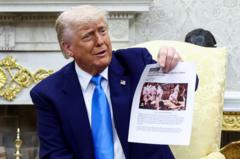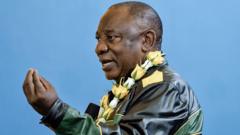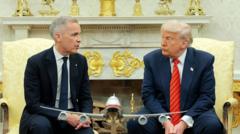**In a provocative Oval Office conversation, Trump criticized South African President Ramaphosa, citing unfounded claims of violence against white people in South Africa, reflecting ongoing racial themes in his political narrative.**
**Trump's Controversial Stance on Race During South Africa Meeting**

**Trump's Controversial Stance on Race During South Africa Meeting**
**President Trump portrays himself as a defender of white individuals during an Oval Office meeting, igniting debates on race relations.**
In a high-profile meeting at the White House on Wednesday, President Donald Trump presented himself as the protector of white South Africans during a controversial discourse with South African President Cyril Ramaphosa. Throughout the meeting, Trump claimed that "dead white people" were being victimized and urged Ramaphosa to address these alleged injustices.
Despite the lack of police data supporting Trump's assertions about white vulnerability to violent crime in South Africa, he continued to push this narrative. Trump's aggressive stance illustrated his long-standing focus on racial issues, frequently portraying white Americans as the primary victims in a society he asserts favors minority groups. His remarks resonate with a section of his supporters who believe in a system skewed against them.
In response to Trump's confrontational approach, Ramaphosa appealed for a more constructive dialogue, recalling the teachings of Nelson Mandela. He highlighted the need for civility and mutual respect between the two nations, pointing out that post-apartheid South Africa is striving to heal and grow beyond its divided past.
The interaction underscores Trump's ongoing efforts to frame himself as a champion of white grievance, particularly as he seeks to energize his base leading into potential election campaigns.
Despite the lack of police data supporting Trump's assertions about white vulnerability to violent crime in South Africa, he continued to push this narrative. Trump's aggressive stance illustrated his long-standing focus on racial issues, frequently portraying white Americans as the primary victims in a society he asserts favors minority groups. His remarks resonate with a section of his supporters who believe in a system skewed against them.
In response to Trump's confrontational approach, Ramaphosa appealed for a more constructive dialogue, recalling the teachings of Nelson Mandela. He highlighted the need for civility and mutual respect between the two nations, pointing out that post-apartheid South Africa is striving to heal and grow beyond its divided past.
The interaction underscores Trump's ongoing efforts to frame himself as a champion of white grievance, particularly as he seeks to energize his base leading into potential election campaigns.





















